How to reduce the amount of alcohol consumption this Summer

It’s no secret that a strong drinking culture exists in the UK, and summer brings it out more than any other season. While there’s nothing wrong with enjoying a few pints in a beer garden, the effects of consuming too much alcohol can be catastrophic.
Reducing the amount of alcohol one drinks this summer could mean that one gets to enjoy this cherished season without constant hangovers, liver damage, and potential dependency or addiction.
The risks of drinking in the summer
Consuming alcohol always involves risk. As much as alcohol is normalised in the UK, it remains an addictive substance that alters the way human minds and bodies function. In the summertime, drinking is riskier than ever for various reasons.
Dehydration
Alcohol is a diuretic. Scientifically speaking, it blocks the vasopressin hormone, which regulates body fluids. The way this is experienced is by needing to go to the toilet more often, resulting in more water loss and dehydration.
Drinking in hot weather creates a perfect storm for dehydration. The effects of alcohol mimic the body being overheated, causing it to counteract this by sweating, which leads to even more water loss.
Dehydration can cause symptoms like fatigue, dizziness, sunken eyes, dark and strong-smelling urine, thirst, dry mouth, and confusion. Some of these symptoms overlap with drunkenness, so it’s vital to recognize dehydration early to prevent a serious reaction.
Sunburn
How many individuals are more cautious about applying suncream when drinking? Not many. But alcohol increases the risk of sunburn, resulting in many who drink excessively in the summer suffering from inflamed skin, swelling, blisters, and tenderness in the affected area.
Repeated sunburn isn’t just a temporary annoyance; it elevates the chances of developing melanoma. So, in the long term, drinking excessively in the summer can spur the development of cancer.
Car accidents
Did one know that the rate of drink driving surges in the summer? August is recorded as the worst month for drink driving, with July coming second.
London is already the most perilous city in the UK for driving, with 50 casualties per square mile in 2021. Yet, driving in the summer in London carries additional danger due to high rates of drink driving.
If everyone reduced their drinking this summer, the roads would be markedly safer.
Heat stroke
Dehydration is not the only health risk when drinking in the sun. Heat exhaustion can occur much faster when alcohol is involved, and the symptoms are worsened by consumption.
When one’s body temperature rises to hazardous levels, symptoms may include an increased heart rate, headaches, flushed skin, excessive thirst, loss of appetite, and nausea.
Sometimes, symptoms can be reversed if identified promptly. However, often, heat exhaustion progresses to heat stroke (requiring immediate medical care). When one has been drinking excessively, it’s easy to miss heat stroke signs, which can be lethal.
How to reduce the amount of alcohol one drinks this summer
Even if one agrees that it’s necessary to reduce drinking this summer, knowing where to start can be challenging. Whether it’s dependence on alcohol, unfamiliarity with personal limits, or peer pressure, there are tips to minimize one’s drinking.
Be Mindful When One Drinks
Many individuals purchase drinks without keeping track of consumption. When surrounded by those who are oblivious to their drinking habits, it becomes second nature.
One should be mindful when drinking. Consider the number of drinks, how one feels, and whether another drink is manageable. This will prevent overindulgence that may lead to loss of control.
Don’t Make Every Event into a Drinking Occasion
London offers countless activities during summer that don’t involve drinking. The city has an extensive sober community, ensuring every summer weekend can be filled with enjoyment without alcohol.
Whether you’re into golf, live music or theatre, London presents alternatives to binge drinking.
Frequent drinking for social events can lead to a sense that enjoyment is only possible with alcohol, turning into dependency or a precursor to addiction.
Balancing nights of alcohol consumption with sober nights can nip this issue in the bud.
Drink With People One Trusts
Drinking with unknown or untrusted people poses higher risks. One cannot guarantee that safety will be prioritised.
Not every stranger will take advantage, but caution is needed to avoid dangerous situations when drunk. Drinking with known individuals still carries risks, but the likelihood of staying safe is higher.
Set Boundaries Ahead of Time
Peer pressure gets to people much more when they haven’t set boundaries ahead of time. Those who don’t know how much they are going to drink on a night out, they can be easily persuaded to drink to excess.
On the other hand, if someone decides how much they are comfortable drinking before going out, they can stick to this decision even when others want them to drink more. When someone is tempted to overstep their own boundaries, they should remind themselves why they set them.
It may be that someone wants to prove to themselves that they can drink moderately, they want to avoid a hangover or they don’t like the person they become when they drink too much.
Get organised with alcohol
Organising drinking patterns may seem odd, but preparation can prevent unintended overindulgence. Some strategies include:
- Choose a low-strength drink
- Don’t mix drinks (and avoid pre-mixed drinks)
- Don’t keep alcohol in the house
- Keep a water bottle close and take regular sips
With these tips, one doesn’t have to quit drinking entirely. A healthy relationship with alcohol can be established by anticipating risks beforehand.
The benefits of monitoring summertime drinking
Below, the article outlines the benefits of monitoring summertime drinking:
Being healthier
Those who consume alcohol in moderation (or not at all) are generally healthier than heavy drinkers.
Avoiding excessive alcohol consumption is beneficial to the brain, liver, kidneys, lungs, and almost every part of the body. Soft drinks, on the other hand, are the heart rate and blood pressure’s best friend.
While many Brits enjoy social drinking, especially during the summer months, it’s important to be aware of the risks and take steps to minimize the amount one consumes. By following the advice outlined in this article, one can enjoy the season responsibly and reduce the potential for negative consequences associated with excessive drinking.
The mood will be better
One might feel on top of the world after a glass of wine or three, but that elation swiftly diminishes. Alcohol is a depressant, a fact that cannot be overlooked. A huge number of individuals with alcohol addiction suffer from depression for this reason. By limiting one’s drinking, one may discover that one’s mood becomes much more even. The intense highs and lows of being intoxicated and then hungover will be avoided, resulting in potential feelings of less anxiety, sadness, or anger.
Remembering the summer
Reducing drinking this summer allows one to preserve precious memories. Regular inebriation can seriously impair memory, so even if amazing events are remembered initially, the recollection might fade. Having a few drinks won’t rob one of summer memories; why not adhere to moderate drinking to relish summer 2023 in the years ahead?
Avoiding serious drinking problems
Nobody anticipates becoming addicted to alcohol. Even if control over drinking has been maintained thus far, considering the risk of alcohol reliance is crucial. The optimal way to evade alcoholism is to abstain from drinking. But it is understood that not everyone will make this choice, so the next best option is to cut back. By being aware of consumption, one may identify signs of dependency early on. Regrettably, denial is a major indicator, and there’s no guarantee that help will be sought in such circumstances. Hence, it’s vital to gauge the risks, be transparent with trusted people, and monitor mental health to manage triggers, preferably with a professional.
When does summertime drinking become a problem?
One might think that the signs and symptoms of alcohol dependency and addiction are obvious. Yet, there are many individuals who fit the criteria for this and still are unaware that they have a problem. So how can society distinguish between standard summertime drinking and a mental health condition? Firstly, society needs to acknowledge that even drinking habits perceived as ‘standard’ may be incredibly harmful. It’s seen as ‘standard’ for university freshers to binge drink multiple times a week, but this is still extremely dangerous.
This means what one classes as regular summertime drinking may actually be a lifestyle of alcohol dependency, even if all one’s friends are doing the same thing. According to NHS guidelines, if one is going to drink alcohol, they should consume no more than 14 units of alcohol per day across at least three days. Exceeding this amount could indicate an alcohol problem.
Yet, a problem with alcohol is not necessarily a dependency or addiction. Dependency comes with physical withdrawal symptoms, tolerance, and continued use of alcohol despite the negative effects it produces. People tend to say that dependency crosses over into addiction when it impacts the individual’s everyday life in various ways. There will be psychological symptoms as well as physical, e.g., a lack of motivation, irritability, denial and/or aggressiveness.
If an individual is dealing with dependency or addiction, it is essential that they seek help by contacting their GP (or dialing 999 for urgent cases). There are various resources available, including places at London rehab clinics and support from charities such as We Are With You, FRANK, and Adfam. The advice on reducing alcohol intake does not apply to individuals with these conditions; sobriety is generally considered the only viable option.
“Will stop drinking next summer”
It’s incredibly common for individuals to put off getting help when they have a problem with alcohol. If this is relatable, one might be thinking ‘One will enjoy the summer first and then seek help’. This is a sign of denial. One may think they just want to enjoy the summer, but they are avoiding sobriety by convincing themselves that summer is the main obstacle (and not the temptation to keep drinking).
There will always be a million reasons to keep drinking. One is going on holiday, then it’s their birthday, then Christmas; there is never a perfect time to stop. This can sound demoralising to those with addiction, but in reality, the belief is that there is no better time to quit than right now. No matter how many events are coming up, how tempted one is, how much pressure one’s facing, it’s always going to be a huge battle to get sober, but an achievable one.
Get help for alcohol issues
Depending on the severity of one’s problems, there are different resources in London that can help. Some of these are strictly for individuals with an alcohol problem, but many are open to those who want to support a loved one with this issue. If an individual is struggling with an addiction, inpatient rehab should be the only option they’re considering. It offers the best chance of keeping them sober, and it introduces them to great resources in London such as experienced therapists and career advisors.
The editorial unit
























Facebook
Twitter
Instagram
YouTube
RSS